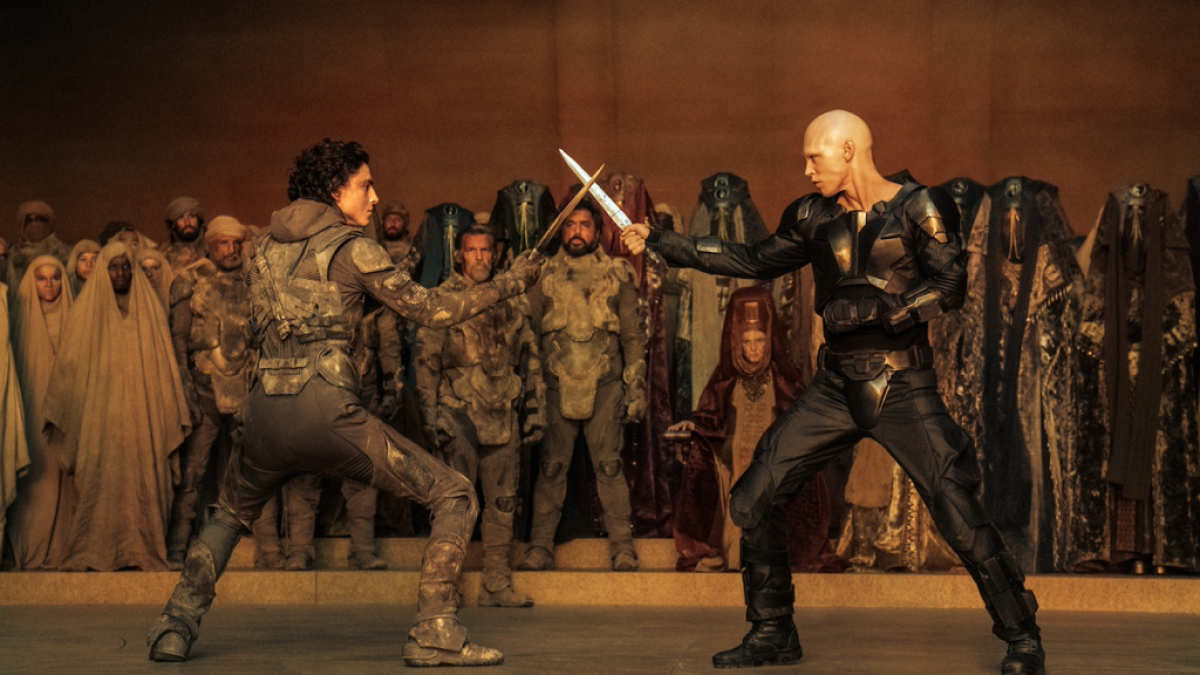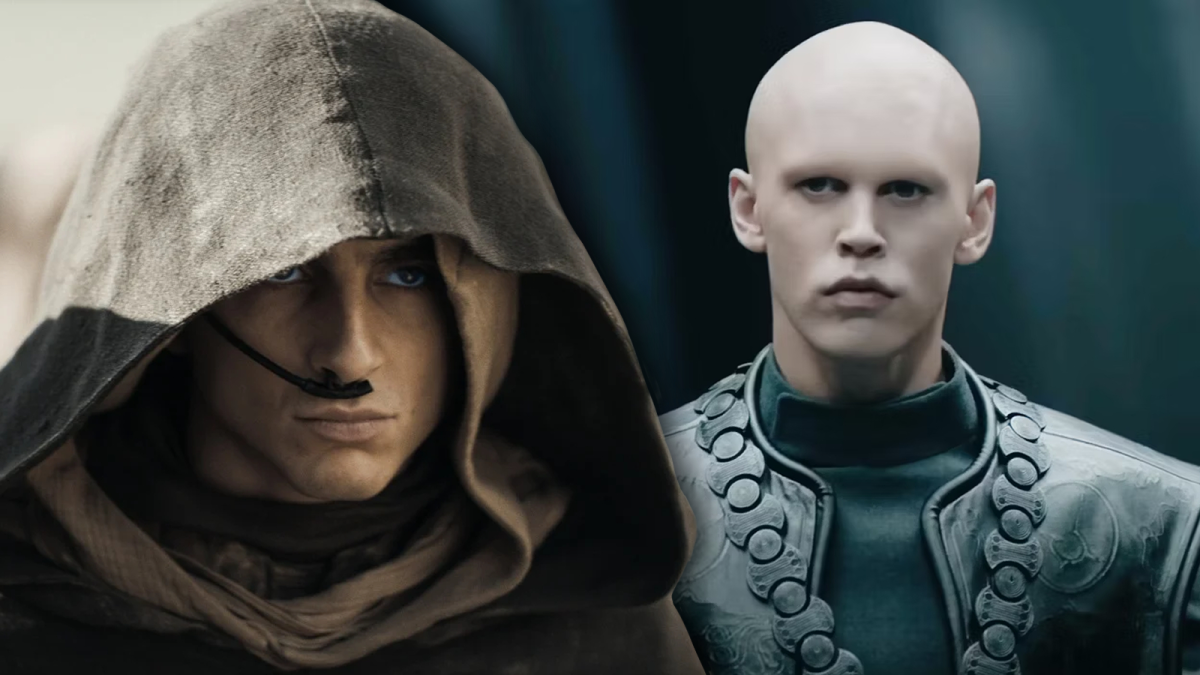Sandworms and spice aside, the most fascinating aspect of Denis Villeneuve’s Dune movies (like the Frank Herbert novel that inspired them) is how they tackle the “Chosen One” trope. This is especially true of Dune: Part Two, which – in a delicious twist – asks us to choose the least worst messiah.
Related: Dune: Part Two’s Ending, Explained
It’s a huge step change from benevolent liberators such as The Matrix‘s Neo, or even prodigal saviors like Star Wars‘ Anakin Skywalker. Even when folks like this falter, their purpose is clear; their innate exceptionalism unquestioned. They will save the day, and everyone will live happily ever after. As such, we know we shouldn’t simply support them – we should embrace them.
But that’s not how Herbert or Villeneuve want us to approach Dune‘s Paul Atreides or Feyd-Rautha Harkonnen. On the contrary, both Herbert’s book and Villeneueve’s films take pains to establish both men as less-than-ideal messiahs. Whomever we pick, the outlook ain’t great. Forget utopia: we have to settle for the outcome that yields the most good for the least harm.
Sizing Up Dune: Part Two’s Manufactured Messiahs
Of course, Dune‘s two savior figures aren’t created equal. Paul is technically Dune: Part Two‘s only “real” messiah – even though he wasn’t meant to fill the role. Paul’s mother, Lady Jessica, was supposed to deliver a girl, who would herself give both to the Bene Gesserit sisterhood’s manufactured messiah, the Kwisatz Haderach. Lady Jessica rebelled, the Kwisatz Haderach arrived a generation early in the form of Paul, and the Bene Gesserit’s schemes quickly went pear-shaped. Even so, as faux-Chosen Ones go, Paul is the real deal.
Feyd-Rautha, though? Not so much. He’s not the Kwisatz Haderach and was never meant to be. That said, Feyd-Rautha is (like Paul) part of the Bene Gesserit’s mapped-out Kwisatz Haderach bloodline. Feyd-Rautha was intended to father the Kwisatz Haderach until Paul’s birth scuttled everything. As such, he’s lucked out as far as genetics go. True, he lacks Paul’s prophetic powers, but he’s nevertheless a force to be reckoned with in combat, and charismatic in a so-psychotic-its-sexy way. So, it’s inevitable that he’s ultimately positioned (implicitly by Herbert, explicitly by Villeneuve) as a viable alternative to Paul.
Related: Dune: Part Two Is a Spectacular Spice Melange for the Mind and Senses (Review)
Indeed, it’s hardly surprising that Dune: Part Two depicts the Bene Gesserit as willing to throw their badly tattered playbook out the window and join Team Feyd-Rautha. The young Harkonnen will never be a true Kwisatz Haderach, nor will he be an especially wise or just ruler. But he will be controllable. Pop him on the Emperor’s throne and some (like the population of Arrakis) will likely suffer, however, the overall status quo won’t shift dramatically. Ironically, if you want to minimize bloodshed, Feyd-Rautha’s the horse to bet on.
The same can’t be said if Paul’s running the show. Sure, Paul is inherently noble where Feyd is irredeemably cruel, and reluctant to assume power where Feyd takes it as his birthright. Yet Paul’s also driven by revenge (however justifiably) and backed by powers – both superhuman and military – that no one can withstand. He’s the poster boy for the kind of change the Dune universe arguably needs, but billions will die along the way. And crucially, Paul knows it.
Paul Atreides Isn’t a Worthy Messiah – He’s Just Worthier Than Feyd-Rautha

That’s the genius of Herbert’s story and Villeneuve’s retelling of it: they make us complicit in Paul’s actions. We know that the young duke-in-exile will unleash a holy war on an untold scale if he comes out on top, yet we still root for him over Feyd-Rautha. Why? Partly, it’s because Paul is our protagonist. We understand him and sympathize with his desire to bring down the Harkonnens and everyone else responsible for the fall of House Atreides. But more than that, deep down, we know he’s still a better option than Feyd-Rautha.
Feyd-Rautha is, to put it bluntly, a monster. Even if his prospective reign were jihad-free, it would never aspire to the kind of benevolent dictatorship Paul strives for, That’s a low bar – but then, that’s Dune: a world of pragmatic choices, not fairytale endings. What’s more, Feyd-Rautha is unknowingly a Bene Gesserit puppet, something that Paul (for all his faults) isn’t guilty of. Admittedly, Paul relies on Bene Gesserit baloney to cement his position, but the sisterhood’s days of tugging strings behind the scenes are numbered on his watch.
Related: Is Jason Momoa in Dune: Part Two? Explained
Again, none of this makes Paul a worthy messiah. Herbert and Villeneuve are in agreement that such a thing doesn’t exist, and that no leader should be elevated to superhero status. He’s just more worthy than Feyd-Rautha. Unlike Paul’s fervent Fremen supporters, we’re supposed to pinch our noses and support him before Dune: Part Two‘s closing credits roll (although emulating the stance of Paul’s ex, Chani, and walking out on the whole sorry situation is certainly tempting).
We choose Paul Atreides because he’s the best messiah Dune: Part Two has to offer – and may God (or at least, the Maker) forgive us for it.
Dune: Part Two is in cinemas now.






Published: Mar 14, 2024 02:00 pm